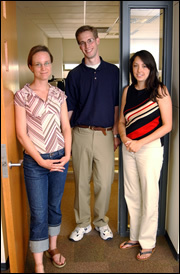
On Aug. 23, Notre Dame freshmen stepped into their first classes at the University, symbolically marking the rite of passage from high school to college that has been in the making for years.
But another group new to campus experienced differentfirst day of schooljitters – the kind you get when youre the one mapping the direction of the class. From unpacking boxes to constructing courses, new faculty at Notre Dame face the same number of adjustments as the students they teach.
Its been a huge relief to be finished with grad school,says Abigail Waggoner Wozniak, a new assistant professor of economics and econometrics who recently earned her doctorate from Harvard.
I was fortunate to have advisors who were candid about this being a positive change, though I dont feel like Ive made the transition fully yet. I think the whole first year is described as one of transition.
Waggoner Wozniak shares her newcomer status with two other assistant professors in the Department of Economics and Econometrics, Kasey Buckles and Dan Hungerman.
The department is oriented to absorbing three new people. Help like that is really valuable with all of us learning at the same time,she adds.
Notre Dames Kaneb Center for Teaching and Learning offered a weeklong teaching seminar and orientation for new faculty, during which Waggoner Wozniak, Buckles and Hungerman could share concerns and exchange questions ranging from the mundane (How do I get a copier code?) to the transcendent (What is the Notre Dame philosophy and how do I fit in?).
The collaborative effort of the orientation made it fun,Hungerman said.
The teaching seminar was quite useful,Buckles added.We could ask each other questions, and being among other new faculty provided a built-in network.
So how do three new Ph.D.s approach a classroom setting and dozens of expectant students? In the case of these three,newdoesnt necessarily meaninexperienced.
I feel quite prepared to teach,says Buckles, who earned her doctorate fromBostonUniversity.Ive taught several times – including a semester atDartmouth, which has a similar student population to Notre Dame.
Because I was well-advised, I feel trained. There is lots of support here and I dont feel at all like Im flying without a net.
Waggoner Wozniak recognizes the reality of this new independence:This is the first time Ive been away from a core set of advisors, with no one to talk to about these issues. That will be challenging.
Hungerman, a public economist from Duke who researches the impact of public policy on religious activity – specifically charitable giving – will teach three sections of microeconomics, his favorite course as an undergraduate.
One thing I appreciate about Notre Dame is that before I took the job, the faculty communicated a willingness to match my teaching load with my own interest in economics.
Waggoner Wozniak, a labor economist who researches geographic mobility and education level, recognizes the caliber of student shes teaching and adapts her expectations accordingly.
Its a big mystery to me how much I can ask of students, so I try to remember my undergraduate experience,she says of her class, comprised mostly of first-year students.
She teaches an introductory course in microeconomics – the first class in the discipline, and for many, the only class.
People speak highly of students here. I hear good things about studentswork ethic -its unusual, even compared to Harvard, where I came from. My impression so far has been very positive.
Whether brand new or emeritus, faculty know that effective teaching and distinctive research work in tandem, and Waggoner Wozniak, Buckles and Hungerman will seize the opportunity to seek answers to new questions.
Bucklesdissertation, which explores womens fertility choice and lifetime earnings, serves as a framework for her further research.
I plan to continue in the same vein, looking at it in a developing context,Buckles says.For example, how the economic well-being of women in developing countries is affected by fertility choices.
Hungerman, too, will extend his research to examine others ways public policy has affected religion. His philosophy on research, on teaching and on life comes fromSeason on the Brink,a book aboutIndianaUniversitybasketball and coach Bob Knight:Losers want to win. Winners prepare to win.
Its this context that means my focus is on the best I can do right now, no matter what happens in four or five years,he says.
TopicID: 13283